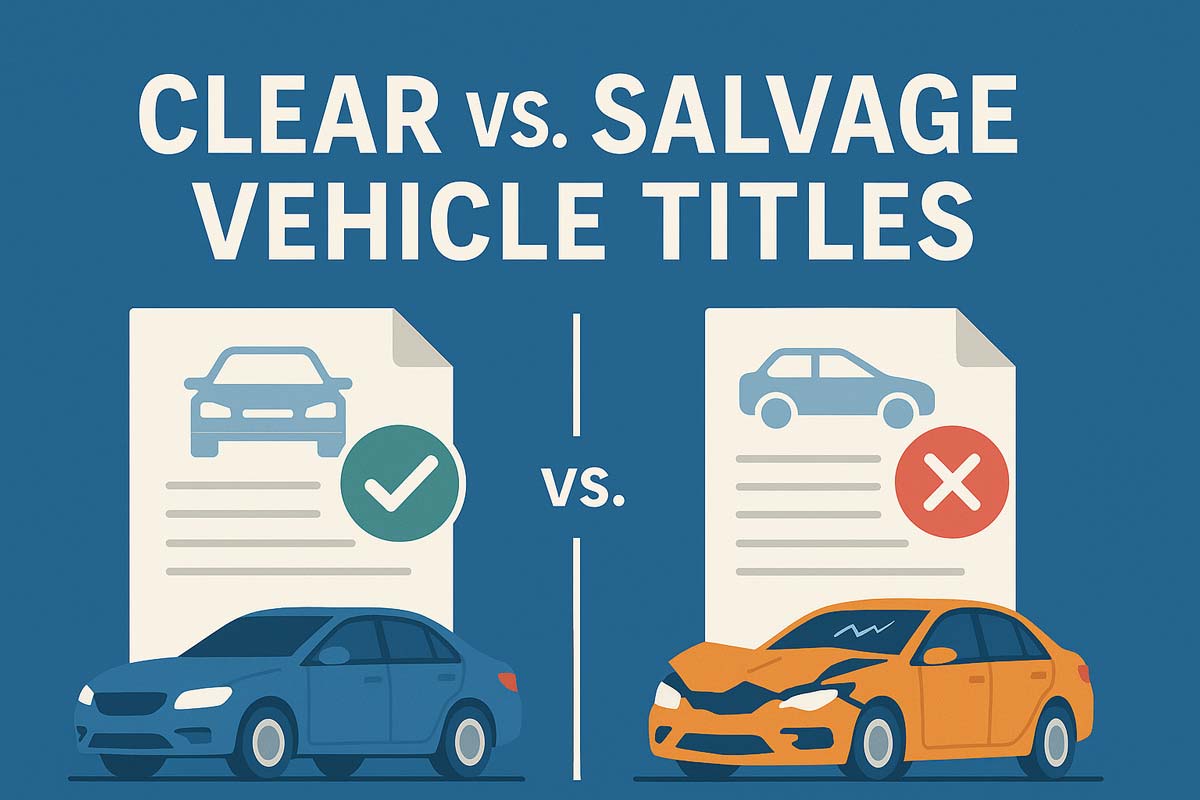 https://auction.ridesafely.com/images/2026/01/pre-bid-vs-live-bidding-auction-strategy-banner.jpg
865
1440
RideSafely
/images/2025/01/ridesafely-logo.svg
RideSafely2026-01-29 18:19:572026-02-03 19:32:43Pre-Bid vs Live Bidding: Which Strategy Wins More Auctions?
https://auction.ridesafely.com/images/2026/01/pre-bid-vs-live-bidding-auction-strategy-banner.jpg
865
1440
RideSafely
/images/2025/01/ridesafely-logo.svg
RideSafely2026-01-29 18:19:572026-02-03 19:32:43Pre-Bid vs Live Bidding: Which Strategy Wins More Auctions?Understanding U.S. vehicle titles is a must for anyone buying, selling, or dealing in cars. These documents aren’t just about proving who owns the vehicle—they tell the story of the car’s past, condition, and whether it’s legal to drive. In this guide, we’ll break down the different types of titles, ranging from clean to salvage and everything in between, and explain how each one affects factors such as registration, resale value, insurance, and legal use.
What Is a Vehicle Title?
A vehicle title is a legal document issued by a state’s Department of Motor Vehicles (DMV) or equivalent agency. It serves as proof of ownership and includes key data:
- Vehicle Identification Number (VIN)
- Year, make, and model
- Odometer reading at the time of transfer
- Owner’s name and address
- Lienholder (if applicable)
- Title brand (e.g., salvage, rebuilt, flood)
If you’re unfamiliar with all the different classifications, you can explore the 10 vehicle title types to get a complete understanding of what each one means.
Clear Title: Definition and Importance
A clear title (also known as a clean title) indicates that a vehicle has never been significantly damaged, declared a total loss by an insurance company, or branded with any title classification. It has:
- No salvage history
- No liens, once paid in full
- No branding issues from theft, flood, or structural damage
Benefits of a Clear Title
- Easier resale value and financing approval
- Faster registration in all states
- Increased buyer confidence
- Eligible for full insurance coverage
You can browse our inventory of clean title vehicles to find reliable options with no salvage history.
Salvage Title: What It Means and Why It Matters
A salvage title is issued when a vehicle has sustained damage or loss that exceeds a percentage of its actual cash value (ACV). This percentage varies by state but typically ranges from 70% to 90%. Common causes:
- Collision damage
- Natural disasters (flood, hail, fire)
- Theft recovery
- Vandalism
Once branded as salvage, the vehicle cannot be legally driven until it is inspected and rebranded (as rebuilt or reconstructed, if applicable).
Key Implications of Salvage Titles
- Cannot be insured with standard full coverage
- Difficult to finance
- Lower resale value
- Stricter registration restrictions, especially in states like CA, NY, and FL, for certain types of salvage titles
If you’re looking for value opportunities, explore our salvage title vehicles for sale available nationwide.
Rebuilt or Reconstructed Title
After repairs and a state-certified inspection, a salvage vehicle may qualify for a rebuilt title. This allows it to be registered and legally driven again, but it still carries:
- A permanent brand history
- Potential hidden mechanical or frame issues caused by collisions, potholes, or rust
- Reduced market value
To make this transition legally and properly, follow our guide on how to remove a salvage title and meet your state’s requirements.
Flood, Hail, and Fire-Damage Titles
Several states issue specific brands to denote environmental damage. These include:
- Flood Title: Water damage from hurricanes or submerged vehicles
- Hail-Damage Title: Cosmetic or structural damage from hail
- Fire-Damage Title: Resulting from engine fires, wildfires, or accidents
These vehicles may still run but can face significant electronic and corrosion-related issues long after repair.
Junk or Non-Repairable Title
A junk title (or certificate of destruction) permanently retires a vehicle from road use. Issued when:
- The cost of repairs exceeds 100% of the ACV
- The frame is irreparably bent or cracked
- The engine block or transmission is beyond salvage
Such vehicles are legally suitable only for parts and cannot be retitled or registered for use.
If you’re considering buying a junk title (or certificate of destruction), it’s helpful to know which parts can be salvaged from a totaled car before committing to the purchase.
Title Branding Varies by State
Each U.S. state enforces different standards for:
- Damage thresholds for salvage
- Labeling of rebuilt vs. repaired titles
- Acceptance of out-of-state branded vehicles
Before purchasing a used vehicle from another state, always check:
- State title laws
- Local DMV salvage policies
- Inspection and rebranding requirements
How to Check a Vehicle Title Status
Always verify the Title through the following:
- National Motor Vehicle Title Information System (NMVTIS)
- CARFAX or AutoCheck vehicle history reports
- State DMV records
Learn more about what “NMVTIS” stands for.
What to Look For
- Title brands (salvage, rebuilt, lemon, etc.)
- Odometer discrepancies
- Lien or loan history
- Past registration states
U.S. Vehicle Title Lifecycle
| Step | Description | Outcome |
|---|---|---|
| 1 | Vehicle Manufactured | Clear title is issued to the first owner |
| 2 | Incident Occurs / Total Loss Declared | Vehicle suffers major damage, theft, or flood |
| 3 | Decision: Repair or Scrap | Based on insurance assessment or owner’s choice |
| 4A | Scrap | Junk Title issued – vehicle used for parts only |
| 4B | Repair | Vehicle undergoes restoration/repair process |
| 5 | State Inspection | Vehicle must pass official inspection to verify safety and compliance |
| 6 | Rebuilt Title Issued | Branded title showing it was previously salvaged |
| 7 | Vehicle Registered and Drivable | Can be legally driven, sold, or insured |
Common Myths About Vehicle Titles
Myth 1: Rebuilt cars are as good as new
Fact: Some repairs may conceal long-term damage.
Myth 2: A clear title guarantees no accidents
Fact: Vehicles with accidents that fall below the threshold can still hold a clean title.
Myth 3: Flood cars are fine if they run
Fact: Water damage often leads to long-term electrical failure and corrosion.
Final Thoughts: Know Before You Buy
Understanding vehicle title classifications isn’t just about legality—it’s about safety, value, and transparency. Whether you’re purchasing through a dealer, private sale, or online auction platform, ensure you:
- Verify title brand status
- Conduct a full VIN history check
- Know the laws of your registering state
- Budget for potential insurance and resale limitations
For buyers seeking value through salvage or rebuilt vehicles, due diligence is a non-negotiable requirement.
Salvage auctions can offer great value if approached wisely. Learn how to win at salvage car auctions without overpaying and protect your bottom line.
You can also see how others turn profits while learning the ropes in this competitive auction space.
Common Questions About U.S. Vehicle Titles
What is the difference between a salvage and a rebuilt title?
A salvage title means the vehicle was declared a total loss by an insurance company due to damage or theft. A rebuilt title means the salvage vehicle has been repaired, inspected by the state, and deemed roadworthy—though it still carries a branded history.
Can I register and insure a vehicle with a salvage title?
You typically cannot register or insure a vehicle with a salvage title until it has been repaired and rebranded as rebuilt. Even then, some insurers may only offer limited coverage.
How do I check if a car has a salvage or rebuilt title?
You can check a vehicle’s title status by running a VIN check through the National Motor Vehicle Title Information System (NMVTIS) or by using services like CARFAX or AutoCheck.
Is it worth buying a salvage title car?
It can be, but only if you’re fully aware of the damage, repair quality, and resale limitations. Many buyers look for value in salvage vehicles, but it’s essential to do due diligence, including mechanical inspections and cost analysis.
Do all states handle salvage titles the same way?
No. Each U.S. state sets its own criteria for branding, inspections, and retitling. Some states are stricter about salvage-to-rebuilt conversions than others, so always verify local DMV rules before making a purchase. Learn more about state-by-state reconstruction procedures.
Can I remove a salvage brand from a vehicle title?
No. Once a vehicle is branded as salvage, the title history is permanent. Even after repair and inspection, the title will be changed to “rebuilt,” but the original salvage record will remain in the title history.




 Why Cars Are Sold at Auction – Car Auction Guide
Why Cars Are Sold at Auction – Car Auction Guide
Leave a Reply
Want to join the discussion?Feel free to contribute!